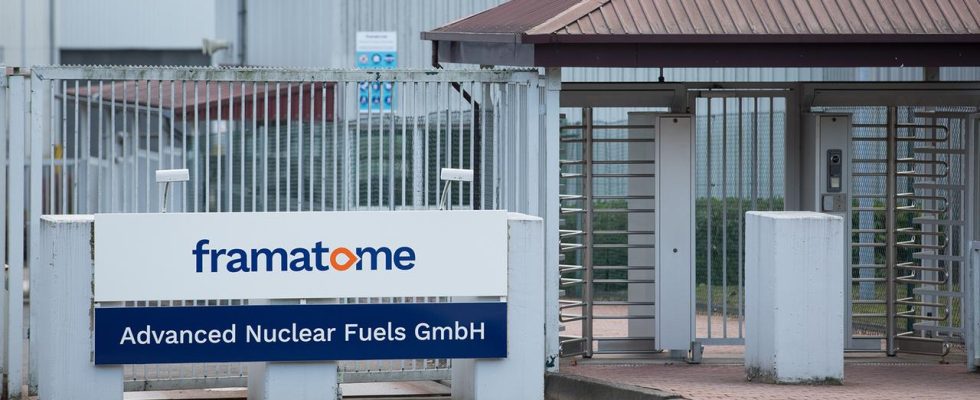exclusive
The trade in radioactive substances between Russian companies and a fuel element factory in Lower Saxony continues. Loud SWR Deliveries are apparently also planned to a company that cooperates closely with the military.
Uranium from Russia is also regularly delivered to Lingen via this route. This is Russian uranium, which is used in France and Lingen, Germany, to produce fuel rods for nuclear power plants.
In the present case, according to the Dutch documents, “uranium-containing products” are to be delivered from the Lingen fuel element factory to the MSZ Machinery company in Elektrostal near Moscow.
The Russian military company MSZ
The MSZ company is working on it SWR-Research directly for the Russian military. Radioactive material is reprocessed in the factory halls around 50 kilometers east of Moscow. In a company video, a senior employee explains: “After processing, the nuclear engineers receive uranium oxide […]. It is used to build atomic bombs and as fuel for nuclear power plants.” According to unconfirmed reports, the plant will also produce fuel rods for nuclear submarines.
Environmental activist and former Navalny employee Alexej Schwarz has researched the company: “MSZ has a license to use nuclear energy for defense purposes, to produce nuclear weapons and nuclear energy systems for military purposes. Any connection with Rosatom is an investment in Russian nuclear weapons .” He demands: “Germany should stop cooperation immediately.”
The Lower Saxony Ministry of the Environment is, among others, responsible for the supervision of the Lingen fuel element factory. Environment Minister Christian Meyer explains that cross-border uranium transports are regulated by the federal government and the EU. His hands are therefore tied.
But he clearly criticizes: “Russia’s nuclear sector in particular is closely linked to the criminal war of aggression against Ukraine and the military use for atomic bombs. Instead of exchanging uranium, radioactive material or nuclear fuel rods with Russia, the EU should also impose sanctions on the nuclear sector, as Vice Chancellor Robert Habeck demanded several times.”
So far no EU sanctions in the nuclear sector
The SWR has asked the responsible federal authorities and ministries for an opinion on the transports from Lingen to Russia. Essentially, everyone refers in unison to the EU. Since there are currently no EU sanctions against Russia in the nuclear sector, uranium transports cannot simply be banned.
The Federal Environment Ministry, among others, writes: “The European Union decides on the further development of the sanctions against Russia. In general, in the BMUV’s opinion, it is a necessary consequence of the Russian war of aggression against Ukraine that European dependence on and business relations with Russia in the civil and to reduce or discontinue the nuclear sector.”
According to the Federal Environment Ministry, such deliveries from Lingen to MSZ in Russia have already taken place in the past.
“Stooge of the Russian defense industry”
Anti-nuclear organizations and environmentalists in Lingen sharply criticize the planned transports. With the planned exports, the fuel element factory in Lingen is turning into a handmaiden of the Russian arms industry, says Julian Bothe from the organization “broadcast”. “The uranium from Lingen is at risk of being used in Russian nuclear weapons and in the Russian Navy’s nuclear submarines. The requested uranium exports therefore clearly violate German and European sanctions rules,” says Bothe.
Alexander Vent has been protesting against the fuel element factory for years with the local citizens’ initiative AgiEL. “The Lingen region is already becoming the focus of Russian interests because of the fuel element factory. The fact that military entanglements are now being added to this situation is further aggravating the situation. The federal government must put an end to this activity and finally close the fuel element factory.”
The owner of the fuel element factory in Lingen, Lower Saxony, the French company Framatome, continues to conduct a brisk uranium trade with Russian state-owned companies. The company does not deny that exports from Lingen to Russia are also planned.
However, the timing is open: “Framatome meets European and state requirements and complies with all international sanctions.” No specific transport dates can be given; there are “currently” no uranium transport planned from Lingen to MSZ.
Uranium trade continues
In the fuel element factory in Lingen, Lower Saxony, fuel rods for nuclear reactors are manufactured from Russian uranium, among other things. For this purpose, uranium is regularly delivered by ship from Russia, even at the moment. The planned exports are as follows SWR-Information about “radioactive production residues” that are to be reprocessed in Russia.
At the EU level, there have long been calls for the nuclear sector in Russia to also be sanctioned. So far this has always failed due to the veto from Hungary. But France is also considered an opponent of sanctions because of its close “nuclear ties” with the Russian state-owned company Rosatom. The MSZ company in Elektrostal belongs to a subsidiary of Rosatom.

